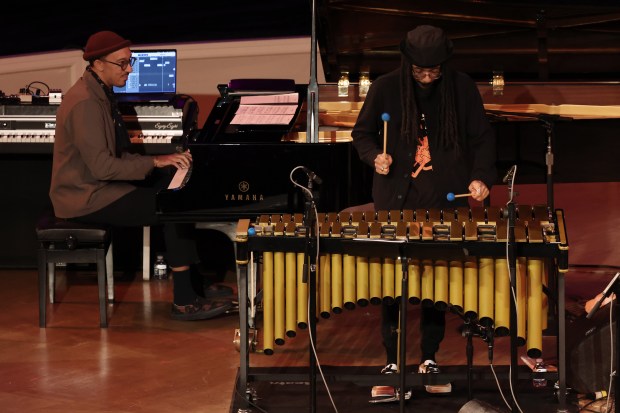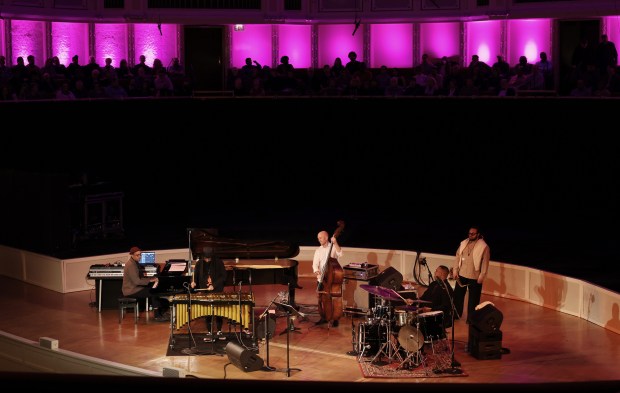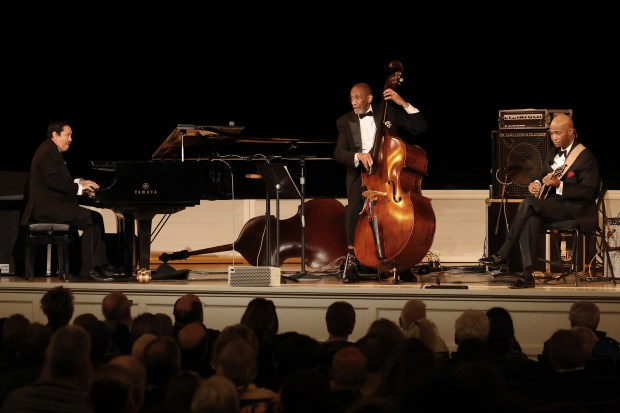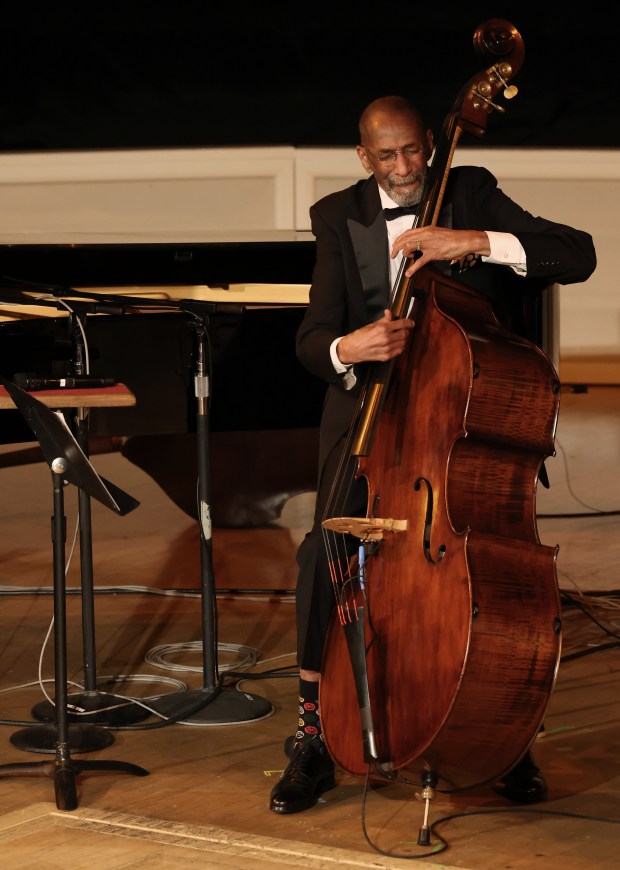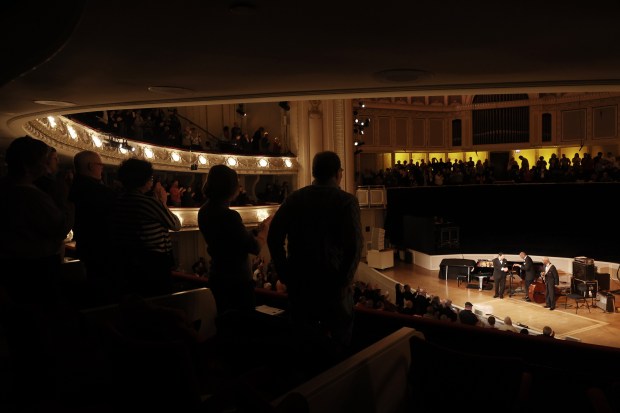[ad_1]
Miles Davis stopped by Chicago last week, and not too soon.
“I don’t want to be known as a ‘legend’. … A legend is an old man with a cane who is known for the things he used to do,” a disembodied Davis growled into the Symphony Center speakers. “I don’t like to be labeled as anything other than a musician.”
Hear, hear. “Myths” are not only outdated, they are indisputable. But when we show respect too often, we become flat. The most illuminating jazz is mortal, not divine; It shines on a branch and stays there until it breaks off.
There was no clearer venue on Friday night than the Symphony Center, which paired bassist Ron Carter (the Golden Striker trio’s first appearance on stage) with the newly minted Blue Note Quintet. Supporting Blue Note Records’ 85th anniversary with a staggering 35-date tour, the quintet is the tasteful label’s newest supergroup: pianist Gerald Clayton, vibist Joel Ross, alto saxophonist Immanuel Wilkins, drummer Kendrick Scott and bassist Matt Brewer. Meanwhile, Carter, the most accomplished jazz bassist in history, is two years older than Blue Note and continues to play with the same lively curiosity he’s had for decades. Two “legends” in a row; Carter and his friends are ahead, Blue Note is behind them.
For starters, change this order. Blue Note homage aside, most attendees were there to catch Carter, as the empty seats after the intermission amply demonstrated.
As the quintet’s set progressed, these seats became more vacant. Using a laptop along with piano and synthesizer, Clayton interspersed an otherwise seamless musical package with obscure, context-free audio snippets from Davis (all that “legend” talk), Wayne Shorter, and others. The originals themselves never left the tense but safe neighborhood of post-bop.
Angular rhythms, open-ended structures and mostly docile progressions made for beautiful solo scenes – especially by Scott, a drummer who balances grinning unpredictability with a fiercely faithful respect for ensemble balance. But as we moved away from the trees to enter the forest, this anniversary party felt more like an exercise in studied coolness than something fresh or insightful.
This is the dilemma of the supergroup. The Quintet features some of the most virtuoso musicians active on the global stage, as evidenced by their respective Blue Note discographies. Ross’ newly released “nublues” has the intense shine of stained glass, and you could listen to Scott’s “Corridors” (2023) a hundred times and hear something new with each listen. But when you put supernovae like this together, they occasionally quench each other rather than reflecting each other’s brightness. On Friday, these mighty lions passed each other, more or less roaring.
A worthy salute to the Blue Note—the bold, sporty Blue Note, not the inflated Blue Note with its own prestige—doesn’t have to be a history lesson or a carved-in-marble tribute. But he better keep his finger on the pulse. It is known that statues do not do this.
Carter and his Golden Striker partners gave the night some much-needed heart. Their captivating hour-plus sets were based on the repertoire the combo had recorded and polished since the Mulgrew Miller days.
Donald Vega, also a bright spot in Carter’s Foursight quartet, has held Miller’s place on keys for years. A quiet, sensitive melodist, he was rightfully given plenty of the semi-lead role on Friday. Russell Malone brought sophisticated texture and depth to the numbers; one minute he was a de facto percussionist, fretless strums doing things the hi-hat could do, the next he was a watercolourist, his guitar ringing with ringing tones.
Always a gentleman, Carter dedicated two songs in the set to the departed musicians: “Cedar Tree,” a tribute to Malone’s Jazz Messengers pianist Cedar Walton, and his own “Candlelight,” honoring guitarist and former duet partner Jim Hall. Carter made a point of meeting the applause on the terrace during his solo greeting throughout the night and made serious comments between numbers. Just like he challenges himself to learn a new word every day.
That night? “Dazzling.”
“And I feel woozy, times 12,” he told the Symphony Center.
I’ll be right back to you, Ron. The trio added an up-tempo Latin flavor to “A Nice Song,” another Carter original. Since the Golden Strikers “weren’t here on the 14th,” they worked into a slow-building rendition of “My Funny Valentine,” Vega’s ghostly and wistful intro.
Their set closed in the same joyous swinging mode that began with Fletcher Anderson’s “Soft Winds.” (At one point, Carter’s clever bass line briefly veered into “So What?”) At least it’s officially closed: Strikers salvage a caressing “There Will Never Be Another You” as an encore.
But the honorary finale was Carter’s signature extended solo just before “Soft Winds.” Just like he did last year’s Jazz FestivalHe moved from “You Are My Sunshine” to the beginning of Bach’s Cello Suite No. 1.
Of course, Carter has done this thousands of times live and on record; So much so that one almost expected Bach’s famous arpeggios to come out of the bass. But on Friday, this quote is stunning with its lively approach and bottomless pleasure! – He had more courage in 45 seconds than the Blue Note team managed in 45 minutes.
There is no “myth” here. Just great artists, deep and real, doing what they always do.
Hannah Edgar is a freelance writer.
 Best American Comics News bestamericancomics.com started its broadcasting life on December 21, 2022 and aims to offer original content to users. Aiming to share information in technology, science, education and other fields, bestamericancomics.com aims to provide its readers with the most up-to-date and comprehensive. Since the content of the site is created by expert writers, readers are reliable and accurate referrers.
Best American Comics News bestamericancomics.com started its broadcasting life on December 21, 2022 and aims to offer original content to users. Aiming to share information in technology, science, education and other fields, bestamericancomics.com aims to provide its readers with the most up-to-date and comprehensive. Since the content of the site is created by expert writers, readers are reliable and accurate referrers.


